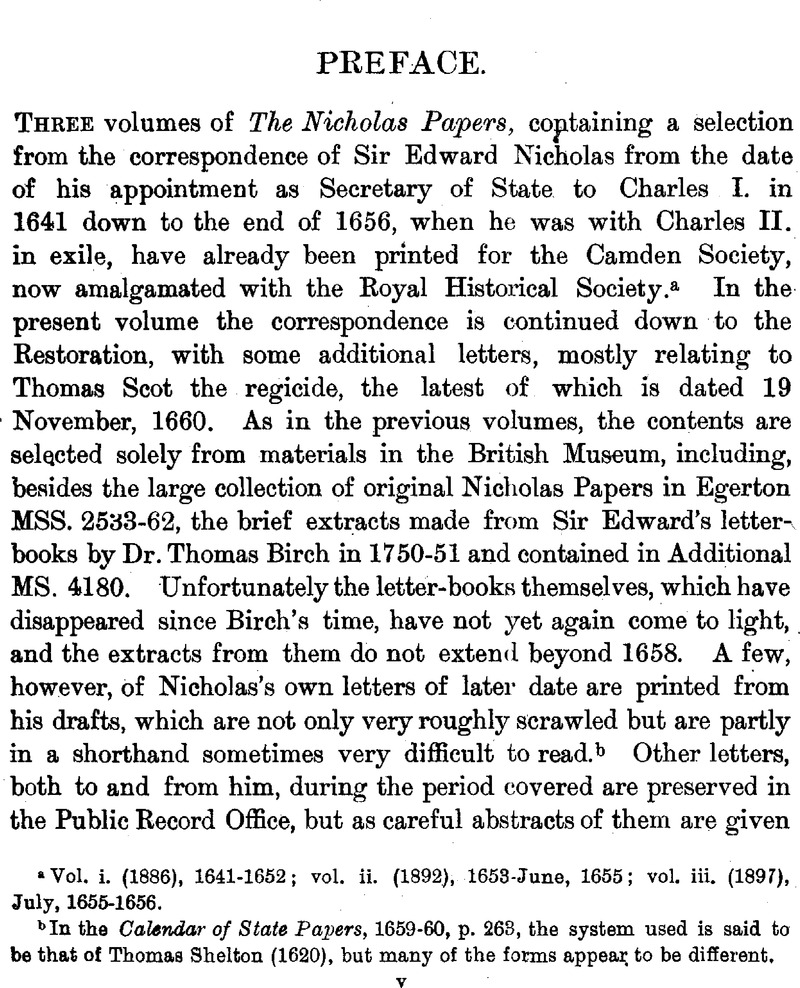No CrossRef data available.

page v note a Vol. i. (1886), 1641–1652; vol. ii. (1892), 1653–June, 1655; vol. iii. (1897), July, 1655–1656.
page v note b In the Calendar of State Papers, 1659–60, p. 263Google Scholar, the system used is said to be that of Thomas Shelton (1620), but many of the forms appear to be different.
page vi note a See his autobiographical notes in vol. i. p. xvii, and vol. ii. p. 88.
page vi note b A list of persons to whom he wrote from 14 January, 1650, to 22 March, 1669, but with a break between Dec. 1655 and 17 Jan. 1660, is in Egerton MS. 2556.
page viii note a In 1656 he had refused to submit a proposal for Cromwell's assassination to the King, though he himself approved it (vol. iii. pp. xx, 265, 270).
page xi note a On its advantage to England see Firth, , Last Years of the Protectorate, ii. pp. 217, 219Google Scholar. Lockhart reported that the French soldiers were enraged at its cession (ib. p. 202).
page xiv note a See a letter from J. Barwick to Hyde, 20 April, 1659 (Thurloe St. Pap. vii. p. 662Google Scholar). It appears that 1200 ships had been lost since the war began, “and yet we brag of our prizes”.
page xiv note b “I would have all my friends look upon Major General Massie and Captain Titus as persons very well affected and devoted to my service and worthy to be trusted by them” (Clar. St. Pap. iii. p. 437).Google Scholar
page xv note a He was certainly not the royalist agent Thomas Ross, afterwards royal librarian, as at one time I thought might be the case (vol. iii. p. xx). As he says on 13 May that he had seen his fellow-traveller “but once since Christmas” (p. 140), the two could hardly have been Titus and Massey.
page xv note b He was named in the King's “Instructions” among those in whom he had great confidence (Clar. St. Pap. iii. p. 487Google Scholar). He must be distinguished from Nicholas's Paris correspondent, Sir Richard Browne.
page xvii note a Commons' Journals, vii. p. 641.Google Scholar
page xix note a Commons' Journals, 19 April, 9 May, vii. p. 646.Google Scholar
page xix note b Writing to Mordaunt on 11 April Hyde says he had just received a letter from him, “by which I find he is melancholy and unsatisfied with the coldness of his old friends” (Clar. St. Pap. iii. p. 455).Google Scholar
page xx note a Mordaunt, writing to Hyde on 6 July, called this a scandalous libel (Clar. St. Pap. iii. p. 517Google Scholar), but there was no doubt of its truth.
page xx note b For Popham's proposals, stipulating that the King should land in the west of England, see Clar. St. Pap. iii. p. 505Google Scholar. His inclinations, according to Rumbold in a letter to Hyde, 23 May, were very good, but neither Massey nor Titus was satisfied with Howe (ib. p. 478).
page xxii note a Commons' Journals, 13 May, 8 June, vii. pp. 650, 674.Google Scholar
page xxii note b Ib. 9 June, p. 677.
page xxiii note a Further correspondence between him and Nicholas, 12 November, 1659, to 16 March, 1660, will be found in the Cal. of St. Pap. 1659–60. In one letter (p. 393) he uses the additional pseudonym William Downeman and addresses Nicholas as Thomas Betts.
page xiv note a The instructions to the Duke of Gloucester, who was to be left behind at Brussels, are in the Appendix (p. 266).
page xxvii note a Commons' Journals, 21 February, vii. p. 846.Google Scholar